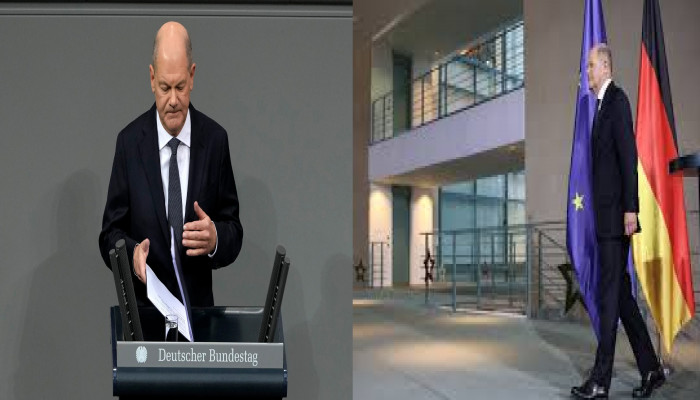Germany faces early elections as Scholz loses confidence vote
- In Reports
- 12:43 PM, Dec 17, 2024
- Myind Staff
German Chancellor Olaf Scholz lost a confidence vote in the Bundestag (Germany's parliament) on Monday, setting the stage for early elections in February.
In the 733-seat Bundestag, Scholz received support from 207 lawmakers, while 394 voted against him, and 116 abstained. He fell well short of the required 367 votes needed to retain his position. After firing his finance minister in a disagreement over how to boost Germany's flagging economy, Scholz's unpopular and infamously acrimonious three-party coalition fell apart on November 6 and he now leads a minority government. However, leaders of various significant parties decided that a parliamentary election should be held on February 23, seven months ahead of schedule.
The German constitution after World War II forbade the Bundestag from dissolving itself, hence the confidence vote was required. At this point, President Frank-Walter Steinmeier must choose between calling an election and dissolving parliament. Steinmeier has 21 days to decide and due to the planned election schedule, he is expected to make the decision after Christmas. Once parliament is dissolved, the election must take place within 60 days. In reality, the campaign has already started, as shown by Monday's three-hour debate. The election will decide if "we, as a strong country, dare to invest strongly in our future; do we have confidence in ourselves and our country, or do we put our future on the line," Scholz, a centre-left Social Democrat, told legislators. “Do we risk our cohesion and our prosperity by delaying long-overdue investments?”
In his appeal to voters, Scholz promises to "modernise" Germany's stringent self-imposed debt accumulation regulations, raise the national minimum wage and lower the value-added tax on groceries. "You're leaving the country in one of its biggest economic crises in postwar history," Friedrich Merz, a centre-right opponent, retorted. “You’re standing here and saying, business as usual, let’s run up debt at the expense of the younger generation, let’s spend money and ... the word ‘competitiveness’ of the German economy didn’t come up once in the speech you gave today,” Merz said.
The chancellor stated that Germany is Ukraine's top military supplier in Europe and aims to maintain this support. However, he emphasised that Germany will not provide long-range Taurus cruise missiles, to avoid escalating the conflict with Russia, nor will it send German troops into the war. “We will do nothing that jeopardises our own security,” he said. Merz, who has been open to sending the long-range missiles, said that “we don’t need any lectures on war and peace” from Scholz’s party. He said, however, that the political rivals in Berlin are united in an “absolute will to do everything so that this war in Ukraine ends as quickly as possible.”
Polls show that Chancellor Olaf Scholz’s party is trailing far behind the main opposition Union bloc, led by Friedrich Merz, which is currently in the lead. Vice Chancellor Robert Habeck, from the environmentalist Greens and another partner in Scholz’s government, is also aiming for the top position, but his party is polling even lower. The far-right Alternative for Germany party, which is gaining strong support in polls, has chosen Alice Weidel as its candidate for chancellor. However, the party has no chance of securing the position since other parties refuse to cooperate with it. Germany’s electoral system usually results in coalition governments, as no single party is close to winning an outright majority. After the election, forming a new government is expected to involve weeks of negotiations.
Confidence votes are uncommon in Germany, a country with 83 million people that values political stability. This was only the sixth time in postwar history that a chancellor has called for one. The last instance was in 2005 when then-Chancellor Gerhard Schröder pushed for an early election, which was narrowly won by Angela Merkel from the centre-right party.







Comments